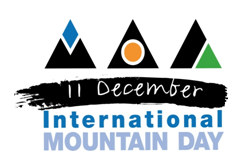It was a surprise when Asylkan and Saparbek Amanov, from the village of Janbulak, in the remote mountains of northern Kyrgyz Republic, became the faces of International Mountain Day (IMD) 2014. A photo of their family has been used on all promotional materials issued by the headquarters of the Food and Agriculture Organization of the United Nations (FAO), including the poster.
The Amanovs illustrate this year’s theme for IMD, “Mountain family farmers: feeding people, nurturing the planet.” Mountainous Kyrgyzstan has more than 300,000 farms. Most are small-scale family farms that produce about 90 percent of the country’s agricultural products. The celebration of International Mountain Day focuses on the valuable contributions that family farms bring to livelihoods.
 The Amanovs were even more surprised when the Mountain Partnership Central Asia Hub at the University of Central Asia arranged for them to travel to the Kyrgyz capital of Bishkek and visit the FAO office. There they met with Dorjee Kinlay, FAO Representative; Aiida Jamangulova, coordinator of Agency of Development Initiatives, a network of women self-help groups; and Elbegzaya Batjargal, Regional Coordinator of Mountain Partnership Central Asia Hub. The Mountain Partnership is an international alliance of partners dedicated to improving the lives of mountain people and protecting mountain environments around the world.
The Amanovs were even more surprised when the Mountain Partnership Central Asia Hub at the University of Central Asia arranged for them to travel to the Kyrgyz capital of Bishkek and visit the FAO office. There they met with Dorjee Kinlay, FAO Representative; Aiida Jamangulova, coordinator of Agency of Development Initiatives, a network of women self-help groups; and Elbegzaya Batjargal, Regional Coordinator of Mountain Partnership Central Asia Hub. The Mountain Partnership is an international alliance of partners dedicated to improving the lives of mountain people and protecting mountain environments around the world.
IMD is one of the last events in the International Year of Family Farming, proclaimed by the United Nations. The University of Central Asia held several events this year to draw attention to the situation faced by mountain families. A Food Revolution event, organized with the Mountain Partnership, highlighted the growing prevalence of malnutrition in mountain regions, and a panel on Mountains: Key to a Sustainable Future assessed how mountain societies are crucial in moving towards sustainable economic growth.
Asylkan Amanov belongs to a self-help group established by the Agency of Development Initiatives (ADI), whose activities advance women’s economic empowerment. ADI helps more than 5,000 family farms improve agricultural production, eradicate poverty and strengthen food security.
Like other farmers in mountain areas, the Amanovs had to adapt to difficult conditions. Living in a cold climate at an altitude of 8,200 feet above sea level limits the farming possibilities. Where the prevailing occupation is cattle herding, Asylkan and her husband Saparbek manage to grow vegetables despite limited land and lack of irrigation water.
In response, the Amanovs brought three trucks of fertile soil from the lowlands and dug a 820-foot canal (250 meters) from the nearest small river to provide their plot with irrigation water. Their hard work has paid off. Now they grow vegetables for their own consumption and for sale.
“Climate-resilient seeds and new knowledge and skills gained at trainings provided by ADI were of great support,” said Asylkan. At the FAO office they shared their mountain farming experience and how they approached challenges.
FAO presented Asylkan with a diploma acknowledging her contribution, alongside other rural women, for improving the situation of women and food security for rural families, and congratulated her for becoming the “face” of IMD 2014.
“You are heroes and we are proud that your family has become the face of IMD 2014, which is of great importance to all members of the Mountain Partnership,” said Elbegzaya Batjargal. Noting that mountain family farmers contribute to sustainable mountain development, Batjargal underscored that the Amanovs illustrate that livelihood flexibility is a key adaptation approach for mountain farmers who depend on the weather.